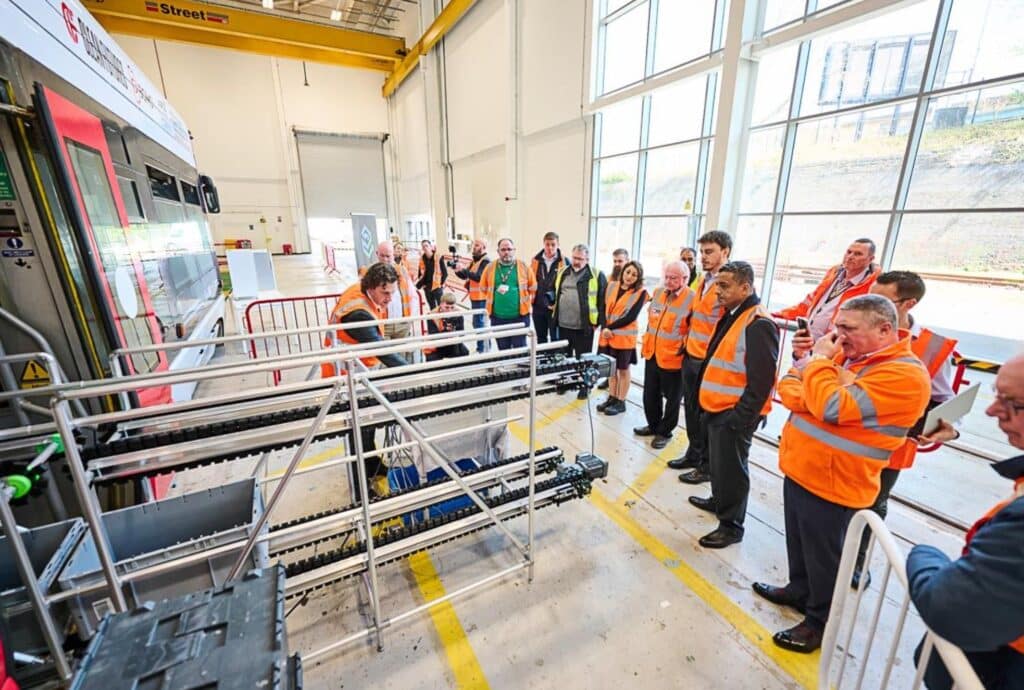With a new life and livery, the iconic Midland Metro Class T69 vehicle – originally designated ‘Tram 16’ – embarks on an exciting journey into the future. Following refreshment work by the engineering team at Black Country Innovative Manufacturing Organisation (BCIMO), it is to become a hub for innovative sustainable transport technology as part of the Clean Futures programme at the Very Light Rail National Innovation Centre (VLRNIC) in Dudley.
Tram 16 made its final stop on the Midland Metro in 2015, into storage and finally on to its new home at the VLRNIC, thanks to a kind donation from UK Tram. The team at BCIMO worked hard over several months to strip out, clean and partially re-fit the vehicle; and a new livery was created and installed in time for a flagship programme event last week.
The Demonstration Day event was designed to showcase innovations from SMEs on the first year of the Clean Futures Accelerator programme, including individual presentations in the centre’s Auditorium and Exhibition Hall, and live demonstrations of the technologies in and around the Engineering Hall. And the centrepiece for the day was Tram 16, not only as a focal point in the Hall, but as a host for several of the innovations being demonstrated.
Photo credit: BCIMO
More information on the individual Cohort 1 SMEs will be coming soon, but essentially those utilising the tram included Adelan with a clean power source for its auxiliary systems and BoxTube and Varamis Rail with two different systems for loading freight onto the vehicle. However, within the broader range of facilities available within BCIMO’s Rail Development & Test Site, and as a complex system in its own right, Tram 16 provides significant opportunities for innovators in future programme cohorts and other organisations needing to test their technology in a rail environment to utilise it much further.
Although plans are already in place to refit the vehicle with a new power source later in the year – our third article will discuss this in more detail – Tram 16 has the potential for technology to be installed and so tested and/or showcased across both its structure and systems.
This could include, for example, in providing further power for non-propulsion, such as lighting and heating, access and safety, alongside sensor and thus monitoring installations. Innovation could also focus on the sub-carriage engineering, such as new, more sustainable construction materials and manufacturing methods; adapting or replacing components, for example, originally made in steel derived from carbon-heavy processes or plastics containing chemicals which mean that they are not recyclable.
Within the carriage, potential could again include ‘greener’ composites for internal panelling, fixtures and fittings; fabrics and contact surfaces which are more hygienic or durable; or driver control systems which are more effective or ergonomic. Even further thought could be given to maintenance innovations, again from the rail to the roof, inside and out. Essentially, innovations which are all encompassed within a ‘clean technology’ for transport mission.
With the launch of Cohort 2 of the Clean Futures Accelerator, regional SMEs will consider three specific challenges facing the rail industry, and the innovations they have designed or could redevelop from existing applications, to address these, namely:
Clean and Efficient Vehicle Manufacturing and Assembly – for solutions that minimise indirect emissions and/or utilise the circular economy. This could include optimising energy efficiency in the production of rail vehicles or reducing waste through more efficient sourcing and recycling or repurposing. It could also address redesign solutions to utilise more sustainable source materials and/or processes; or alternative ‘greener’ materials; or using more lightweight, more cost-effective or longer-life components.
Greener Transport Infrastructure – for both new and retrofit solutions, and specifically to enhance affordability and, of course, sustainability. This could include the use of decarbonised materials in construction process, or systems which reduce the destruction and disruption of utilities. It could also encompass transport operations aspects, such as signalling and control, communications and safety; and more future-focused innovations, which tackle the increasing impact of climate change on both design and materials.
Future Fuels – for a range of solutions across alternative and so more sustainable fuels, such as hydrogen, biofuels and synthetics; including innovations in production, transportation and storage. It could focus on regional initiatives to reduce affordability for local customers and carbon footprint of national distribution, supply to infrastructure where electrification is challenging, production of fuel from waste materials as part of the circular economy, and redevelopment of fuels used in other sectors such as air and sea.
This year, there is also an ‘Open Challenge’, which has a broad remit of innovative opportunities that wouldn’t necessarily fit into the three main challenges, but likewise contribute to sustainable transport and/or clean manufacturing. It also, ideally, is hoping to attract innovations that yield significant advantages for the West Midlands, and contribute to the goals of the regional ‘2041 Plan’, noting that it is designed to “foster a wide array of sustainable solutions that support our collective vision for a greener future”.
Innovators can apply to join the Clean Futures Accelerator programme via the project’s lead partner Connected Places Catapult – more ‘how to’ information will be available via an online Application Support Webinar on 15th May.
BCIMO are also holding an on-site Application Support Workshop at the VLRNIC in Dudley, for innovators focused on the rail, light rail and very light rail sectors, on 21st May. And for those who would like to find out more about the challenges and opportunities within the latter, they are also hosting the next Clean Futures Catalyst workshop, entitled ‘Fast Track 4 Light Rail’ on 28th May.
Naomi Arblaster, Head of SME Development at BCIMO, said: “With the opening of applications for Cohort 2 of the Clean Futures programme and launch of the new industry challenges for the coming year on 30th April, we are really excited to see the innovations our regional SMEs can bring to rail.
“As such, the potential to showcase these on Tram 16, both honours the history of rail in the Black Country and focuses on its future, as we transition to net-zero as part of the broader West Midlands’ decarbonisation agenda.
“There is a real opportunity for innovators to work together too – as we have seen in Cohort 1 – to offer collaborative solutions to the challenges the industry faces, and again the tram is an ideal demonstrator, so we are really grateful to UK Tram for donating it to BCIMO.”
Matt Wood, Clean Futures Programme Manager at BCIMO, added: “Exhibiting the ‘live’ innovations at our Demonstration Day event last week was an essential part of the work we do on Clean Futures, in allowing industry stakeholders and potential investors to see the technology and talk to the SMEs.
“But in a rail-focused environment, having the opportunity to demonstrate directly on rolling stock, to show exactly how solutions can be deployed is a real bonus. So next year – and building on the work we did with the three Cohort 1 SMEs who utilised the tram – the T69 won’t just be a part of the event, it will be that live centrepiece. As such, the engineering team and I really look forward to supporting our new Cohort 2 SMEs as they work towards making this happen over the next few months.”
For more information on BCIMO and the Clean Futures Programme visit the BCIMO website or Contact Us to make an enquiry.
Photo credit: BCIMO


